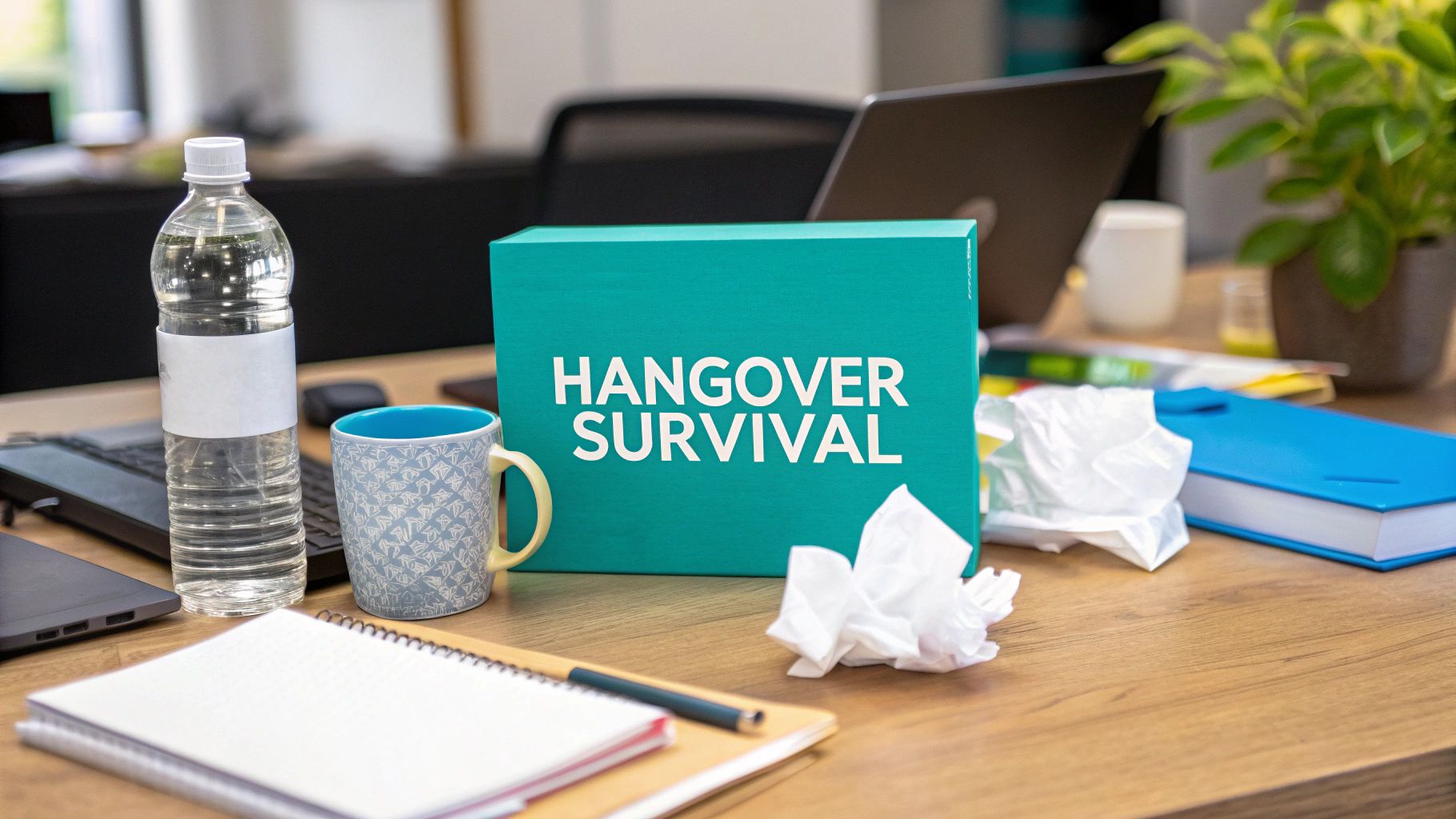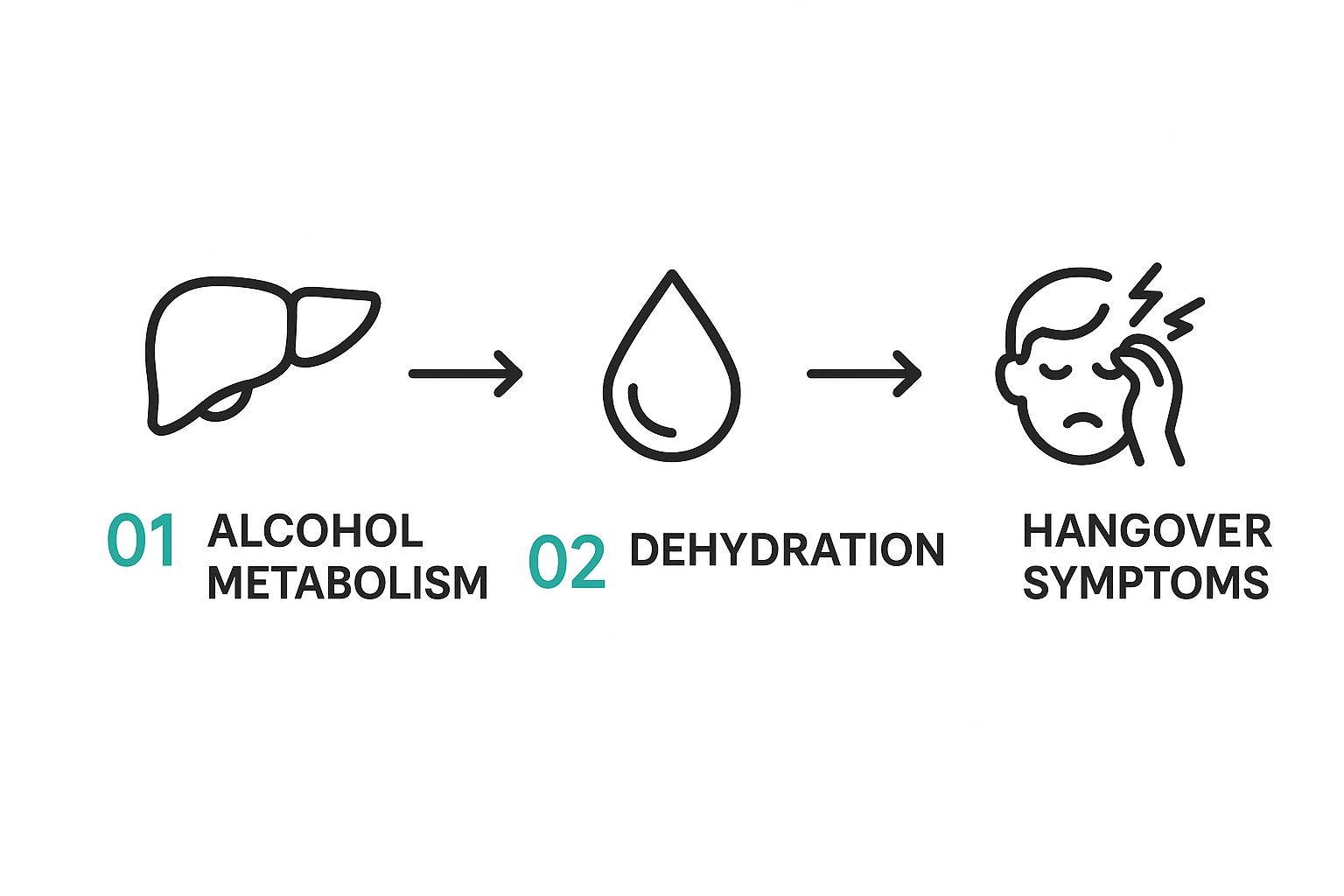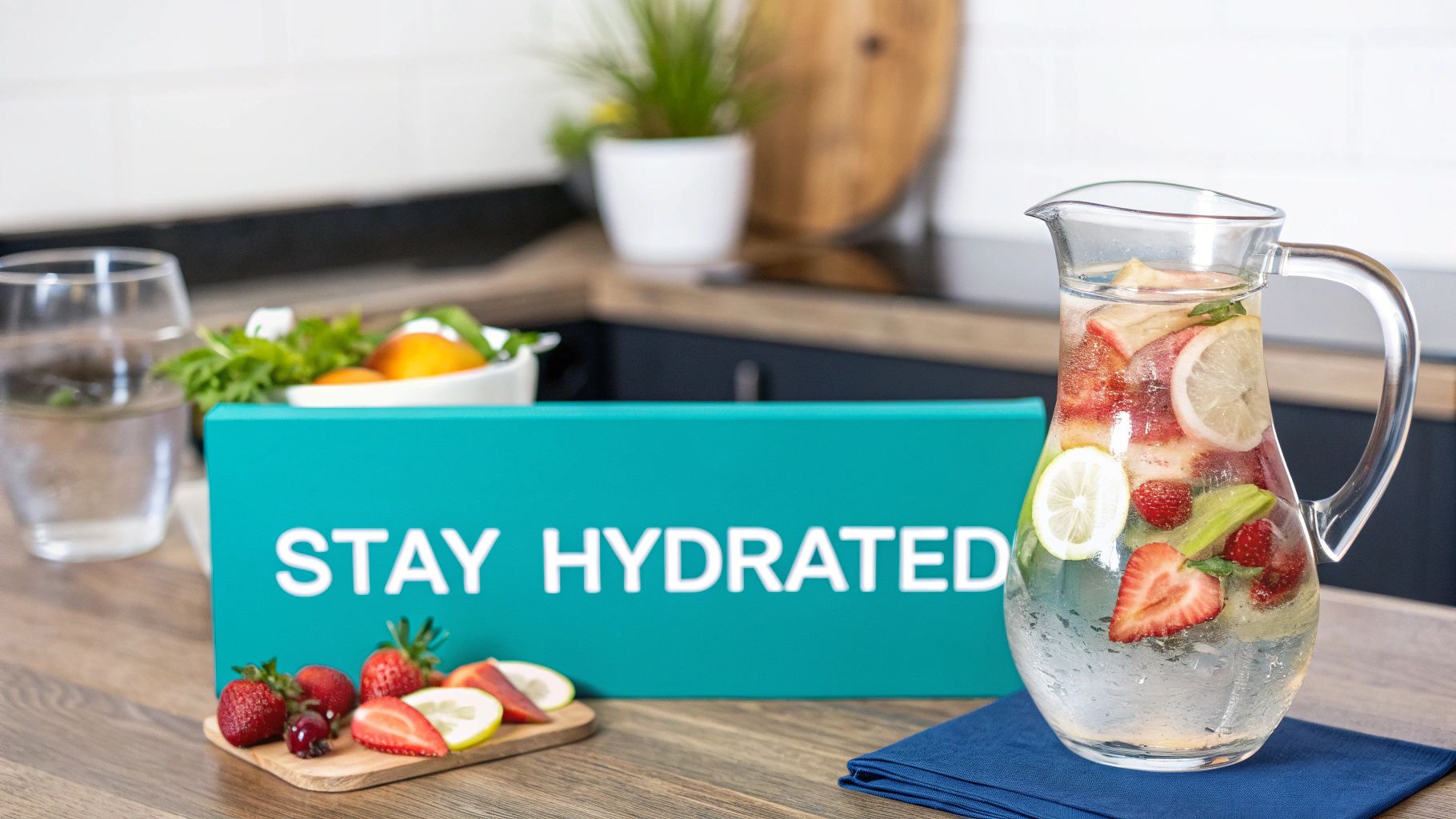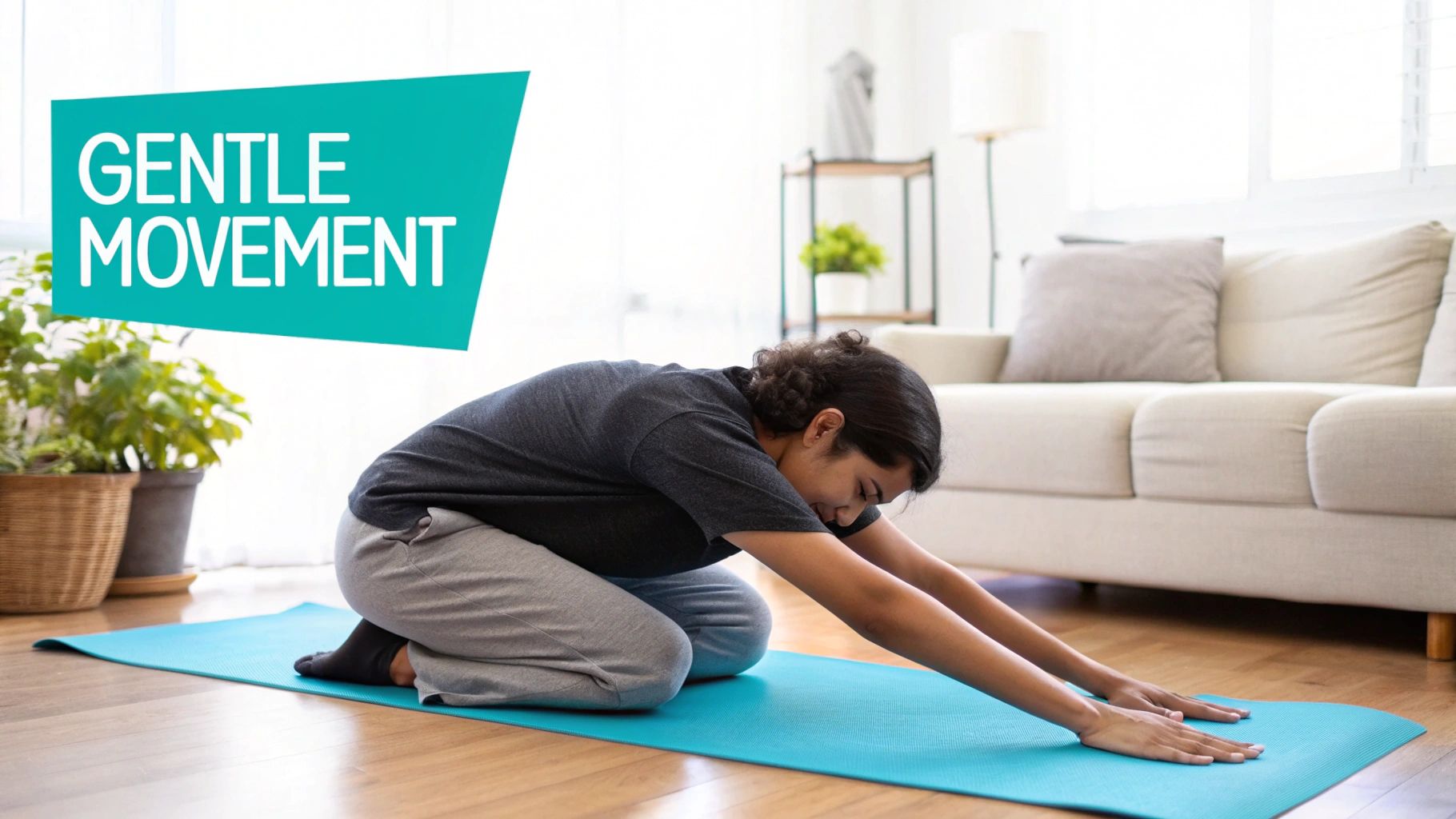

· By Annemarie
Surviving the Day Working With a Hangover
Let’s be honest. That alarm clock sounds less like a gentle nudge and more like a personal attack when your head is pounding and your stomach is doing gymnastics. It’s that quiet, miserable feeling so many of us have powered through, usually with a good dose of shame.
But you know what? It’s way more common than anyone admits. We’re not here to judge. We’re here with a real-deal, practical game plan to get you through the day when you're running on fumes.
The truth is, life happens. Client dinners, team celebrations, or just needing to blow off some steam can easily lead to a rough morning that clashes with a 9 AM meeting. This isn't a time for wishful thinking; it’s time for a strategy.
First, What’s Actually Happening to Your Body?
A hangover isn’t just a bad headache. It’s your body sending out a system-wide S.O.S. Your liver is in overdrive processing everything you drank, your brain is screaming for water, and your immune system might even kick into an inflammatory response.
This all adds up to that lovely cocktail of symptoms: exhaustion, nausea, brain fog, and a sudden, passionate hatred for bright lights.
This breaks down exactly what's going on inside.

As you can see, it’s the double-whammy of dehydration and your body dealing with metabolic byproducts that creates that unique brand of misery. And it directly tanks your ability to think clearly.
Seriously, You’re Not the Only One
If you’ve ever dragged yourself to your desk feeling like a zombie, you're in very good company. It's the silent struggle happening in cubicles and home offices everywhere.
Some quick stats might make you feel a little better. On any given workday, about 1.6% of the full-time American workforce—that's nearly 2 million people—shows up hungover. And while most people aren't making it a habit, around 20% admit to being hungover at work less than once a month. It’s a thing. You can see more on this over at FiveThirtyEight's breakdown of hangovers in the workplace.
Today’s goal isn’t to be a superstar. It’s to be a survivor. Your mission is to get through the day with minimal damage to your projects, your reputation, and your sanity.
This is your action plan, starting the second you open your eyes. We're going to make a few smart, deliberate choices to get you through this.
Your First 30 Minutes Morning Rescue Plan
The first half-hour after you wake up is crucial. Don't just stumble around in a daze. Follow this simple plan to start the damage control immediately.
| Timeframe | Action | Why It Helps |
|---|---|---|
| 0-5 Mins | Drink a full glass of water. | Alcohol is a diuretic. This is the first step to rehydrating your brain and body. |
| 5-15 Mins | Take an over-the-counter pain reliever. | Grab an ibuprofen or aspirin to start tackling that headache before it gets worse. |
| 15-25 Mins | Eat something simple and strategic. | Think bananas for potassium or toast for carbs. Avoid greasy, heavy foods for now. |
| 25-30 Mins | Splash your face with cold water. | It's a quick, effective jolt to your system that helps you feel more alert and human. |
Executing these few steps right away sets a better foundation for the rest of your day. It’s about being proactive, not reactive, when you feel your worst.
Building Your Pre-Work Recovery Kit

Let’s be real. The battle against a workday hangover is won or lost in that first brutal hour at home. What you do before you even think about walking out the door will determine if you just survive the day or actually get something done.
Think of it as putting together an emergency first-aid kit for your body. The mission is simple: counter the chaos from last night.
We start with what I call the "Hydration Trinity." It's a three-pronged attack to get your system back online.
- Water: This is the obvious one, but it’s non-negotiable. Alcohol is a diuretic, which is a fancy way of saying it makes you pee out all your precious fluids. Dehydration is the main culprit behind that splitting headache and dizzy feeling.
- Electrolytes: When you lose all that water, you’re also losing essential minerals like potassium and sodium. An electrolyte packet, some coconut water, or even a banana can help bring those levels back up and stop your muscles from aching.
- Something Gentle: Your stomach lining is probably not your biggest fan right now. A mild herbal tea—think ginger or peppermint—can work wonders to soothe that queasy, upset feeling.
Fueling Your Foggy Brain
Okay, next up: breakfast. I know it's tempting to go straight for a greasy, heavy meal, thinking it will "soak up" the leftover booze. But in reality, a fatty breakfast is just going to make your angry digestive system even angrier.
What your body actually needs are foods that give you a slow, steady release of energy. Drinking can make your blood sugar crash, which is a big reason you feel so weak and shaky.
The goal for breakfast is restoration, not indulgence. You need complex carbs and easy-to-digest proteins that will fuel your brain without causing a gut rebellion.
A few smart choices to consider:
- Oatmeal with berries: Sustained energy and a hit of antioxidants.
- Whole-wheat toast with avocado: Healthy fats and stable carbs for the win.
- A simple smoothie: Blend a banana, a handful of spinach, and a scoop of protein powder. It’s gentle, fast, and packed with nutrients.
This whole proactive morning routine is so much better than trying to play catch-up later. If you want to get really ahead of the game, learning how to prepare for drinking can make the next morning far less painful.
Looking More Human Than You Feel
Finally, let's talk about the outside. Looking as tired as you feel can make you feel even worse, and it’s a dead giveaway to your coworkers. A few simple grooming tricks can make a huge difference.
Splash your face with cold water or use one of those chilled face rollers. It instantly reduces puffiness by constricting your blood vessels. And eye drops? They're your absolute best friend for getting rid of that tell-tale redness, making you look alert even when your brain is in first gear.
Trust me, there’s a huge psychological boost that comes from looking like you have it all together—even when you’re barely holding on.
How to Manage Your Workload on Low Power

Alright, you made it to your desk. That's half the battle. Now, the physical misery starts to morph into a mental one. A hangover isn’t just a headache—it’s a full-on assault against your ability to think. Your focus is nonexistent, even small decisions feel like climbing a mountain, and your patience is basically gone.
Let's be real: today is not the day to be a hero. It's the day to be a strategist. The goal is simple: survive, don't mess anything up too badly, and get your absolute must-dos finished without anyone noticing you're operating at 30% capacity. This means you have to completely rethink your to-do list.
Triage Your Tasks Like an ER Doctor
Your brain is running on fumes, so you've got to conserve every last drop of mental energy. Forget your usual workflow. Today, you’re sorting your to-do list into two very simple piles: "Low-Brainpower" and "High-Brainpower."
- Low-Brainpower Tasks: These are your new best friends. We're talking about the repetitive, administrative stuff you can do on autopilot.
- High-Brainpower Tasks: This is the enemy. Anything that requires deep strategic thinking, creative problem-solving, or making a critical decision goes here.
Once your list is sorted, the game plan is clear. Spend your entire morning knocking out the low-brainpower stuff. This helps you build some momentum and, honestly, the small feeling of accomplishment can be a huge psychological boost when you feel like garbage.
Good low-power tasks for a day like this include:
- Clearing out your inbox (deleting and archiving, not writing long replies)
- Organizing digital files or cleaning up your desktop
- Simple data entry into a spreadsheet
- Scheduling out meetings for next week
- Finally getting to those expense reports
Push all the high-power tasks to tomorrow if you can. If something absolutely has to get done, block out time for it in the early afternoon. By then, you might have a second wind from your morning coffee and lunch.
The Power of Micro-Breaks for a Macro-Headache
A hungover brain has the attention span of a goldfish. If you try to force yourself to focus for long stretches, you're just going to make your headache worse and get frustrated. It’s a losing battle.
Instead, you need to embrace the micro-break. And I don't mean scrolling through Instagram, which will just strain your eyes and pound your head even more. I mean a real reset for your senses.
Think of your focus today as a tiny battery that drains incredibly fast. A two-hour work block is a fantasy, but 25 minutes of work followed by a five-minute break? That you can handle. Those little pauses are your charging stations.
Try following this simple cycle:
- Work on one single, low-power task for 25 minutes. Set a timer.
- For 5 minutes, step away from your screen.
- During that break, get up and stretch. Look out a window. Go refill your water. The one rule is do not look at your phone.
- Repeat.
This approach makes the day feel way less overwhelming and helps you maintain at least a baseline of productivity. It’s a critical strategy for dealing with the "presenteeism" of working with a hangover. Alcohol impairment can tank your productivity by nearly 25%, mostly because it guts your cognitive performance. You can read more about the impact of hangovers on workplace productivity if you're curious.
By working smarter, not harder, you can get through the day without crashing and burning. Your goal today isn't excellence; it's professional survival.
Surviving Meetings and Colleague Interactions
Let's be real, facing other humans is probably the hardest part of working with a hangover. Your brain feels like it’s wading through mud, your patience is thinner than paper, and every single question feels like a personal attack. This is where you need a social survival strategy.
The goal isn't to shine; it's to get through the day without anyone noticing you feel like death warmed over. The key is to strategically shift your role from an active contributor to a quiet, thoughtful observer. Think of yourself as an "Expert Listener." This isn't about being lazy; it's a tactical move to conserve your seriously limited cognitive resources. Let everyone else drive the conversation.
Master the Art of Active Listening (or at least looking like you are)
When you feel awful, the last thing you want to do is talk. Good news: you don’t have to. Instead, you can project an image of deep engagement through some simple, non-verbal cues. This works especially well in virtual meetings where your on-camera presence is all anyone sees.
A few simple moves can make you look like the most engaged person in the room:
- Sit up straight. Slouching basically screams, "I’d rather be in bed." Good posture gives off an air of alertness and professionalism, even if you're faking it.
- Maintain eye contact. Just look at the speaker (or your webcam). It’s a dead giveaway that you’re paying attention, even if your mind is replaying last night's questionable decisions.
- Nod thoughtfully. A slow, deliberate nod when someone makes a good point makes it seem like you're deeply processing their genius ideas.
These tiny physical adjustments create a powerful illusion of focus. It's just enough to buy you the space you need to operate in low-power mode without raising any red flags.
Your goal isn't to be the star of the meeting; it's to be a supportive audience member. Take meticulous notes—this not only helps your failing memory but also makes you look incredibly diligent.
Now, what happens if you get called on unexpectedly? Don't panic. Have a few go-to phrases ready to buy yourself a few precious seconds to actually form a coherent thought.
Strategic Phrases to Stall for Time
- "That's an interesting point, can you elaborate on the data behind that?"
- "I want to make sure I'm following correctly. Are you saying that..." (This lets you repeat what you just heard, confirming you were listening while giving your brain a moment to catch up).
- "Let me just process that for a moment before I respond."
Using these lines turns your silence into a sign of thoughtful consideration, not a symptom of your raging hangover. It’s a simple but seriously effective way to navigate tricky social interactions when you’re not feeling your best and helps you survive the day like a pro.
Smart Snacking and Hydration at Your Desk

You’ve somehow survived the morning meetings, but now the midday slump is creeping in, threatening to hit you like a freight train. What you eat and drink from here on out can either be your lifeline or the anchor that sinks your entire afternoon.
Let's be real, your first instinct is probably to grab a sugary donut or a soda for that quick energy spike. Don't do it. Alcohol messes with your blood sugar, causing it to plummet and leaving you feeling weak and shaky. A sugary snack will just send you on a rollercoaster, ending in a brutal crash that makes things way worse.
Your mission now is to stabilize your blood sugar and start replenishing all the good stuff your body lost last night. We're aiming for a slow, steady burn of energy, not a frantic jolt.
Your Desk-Drawer Survival Stash
Keeping a few smart options within arm's reach is non-negotiable. You need snacks that are easy on the stomach but packed with nutrients.
Here are a few champs to keep on hand:
- Bananas: They're loaded with potassium, an electrolyte you desperately need after a night of drinking.
- Almonds or Walnuts: These pack healthy fats and protein for sustained energy without sending your blood sugar on a joyride.
- Whole-grain crackers: Simple, bland carbs can work wonders to settle a queasy stomach and provide a steady fuel source.
The real secret here is consistency. A small, healthy snack every couple of hours is so much more effective than forcing down one huge lunch. Trust me, a heavy meal will just leave you feeling sluggish and even more nauseous.
This grazing approach keeps your energy levels from completely tanking when your reserves are already on empty.
And don't just chug plain water. Sure, water is critical, but your hydration plan needs to be a bit more strategic. You’ve lost a ton of electrolytes. Try sipping on coconut water or, even better, add a low-sugar electrolyte powder to your water bottle. It makes a world of difference.
Office Snack Showdown: Hangover Edition
To make it dead simple, I've put together a quick guide on what to reach for versus what to run from when the hangover munchies strike at your desk.
| Hangover Heroes (Choose These) | Hangover Villains (Avoid These) |
|---|---|
| Water with electrolytes | Sugary sodas or energy drinks |
| Herbal tea (ginger or peppermint) | Greasy, heavy takeout (pizza, burgers) |
| Bananas, nuts, or seeds | Candy bars, pastries, or donuts |
| Plain yogurt or a protein bar | Salty chips or processed snacks |
Look, making these smart choices throughout the day won't magically cure you. But it's one of the most powerful things you can do to give your body the fuel it needs to recover while you somehow manage to power through your workday.
Your After-Work Recovery and Prevention Plan
Congrats, you survived the workday. But just because you’ve clocked out doesn’t mean you’re home free. The choices you make tonight are absolutely crucial for getting back to 100% tomorrow—and making sure this never, ever happens again.
Your first instinct might be to crush a greasy, heavy meal to "soak up" whatever is left of last night. Don't do it. Your digestive system has been through enough, and a massive dinner is only going to leave you feeling even more sluggish and bloated.
Instead, think light and restorative.
- A classic bowl of chicken noodle soup for hydration and electrolytes.
- Some grilled fish with steamed veggies for protein that’s easy to digest.
- A simple salad with lean protein like chicken or tofu.
This gives your body the nutrients it needs to start repairing itself without piling on more stress. For a deeper dive into recovery tactics, you can check out our guide on how to relieve a hangover.
Break the Cycle with Smart Prevention
Look, the best way to handle working with a hangover is to avoid getting one in the first place. This doesn’t mean you have to become a hermit; it just means being a little more strategic when you know you have to be sharp the next day. And please, don't fall for the "hair of the dog" myth—it’s a classic move that only delays the inevitable crash.
Instead of another drink, focus on hitting the reset button. A gentle, slow walk around the block can do wonders for your circulation without being too strenuous. A warm bath before bed is also a great way to relax sore muscles and prep your body for the deep, restorative sleep it's screaming for.
The goal isn't just to survive today but to thrive tomorrow. A smart after-work recovery plan transitions directly into a smarter prevention strategy for the future.
Avoiding a Repeat Performance
Let’s be real for a second: understanding why you’re drinking is the key here. For a lot of us, alcohol is a go-to tool for decompressing from a high-pressure job. It's not just you; research shows that up to 30% of workers use alcohol to cope with work-related stress. Unfortunately, that habit often leads to poor performance and a higher risk of accidents.
Instead of automatically reaching for another round after a tough day, try building a new post-work ritual. Maybe it's hitting the gym, zoning out with a podcast, or just taking 15 minutes to meditate. By finding a healthier way to shake off the stress, you can still enjoy your social life without sacrificing your productivity. It's a win-win.
Common Questions About Hangovers at Work
Navigating the workplace while feeling your worst brings up some tricky situations. Even with the best game plan, a few questions always seem to pop up when you're just trying to survive until 5 PM.
Can My Boss Tell I’m Hungover?
Honestly? It really depends on your boss and how well you can play it cool.
The most obvious giveaways are physical: bloodshot eyes, a pale face, or worse, still smelling like last night’s bar. Be mindful of your body language, too. Slouching in your chair or avoiding eye contact can scream "I'm not feeling it today."
But the biggest red flag is almost always a dip in your performance. Missing deadlines, making simple mistakes, or being unusually quiet in meetings are far more likely to get you noticed than just looking a little tired. Your best bet is to focus on managing your tasks and interactions carefully to keep up that professional front.
Is It Better to Call in Sick?
This is a total judgment call. If you are genuinely non-functional—we're talking severe nausea, a migraine that won't quit, or dizzy spells—calling in sick is the most responsible choice. Pushing through when you can’t actually do your job doesn't help anyone and seriously increases the risk of making a major mistake.
If you can still manage your workload by tackling easy tasks first and keeping a low profile, it's probably better to show up. But if you know you’ll be more of a liability than an asset, use that sick day. No shame in it.
Will Coffee Actually Help My Hangover?
Ah, the age-old question. Coffee is a bit of a double-edged sword here.
On one hand, it can definitely help fight the fatigue and mental fog with a much-needed caffeine jolt. That stimulation can make you feel more alert and ready to tackle that to-do list.
The downside? Coffee is a diuretic, just like alcohol. This means it can actually make you more dehydrated, potentially making your headache worse in the long run. If you're going to drink coffee, make sure you're also chugging plenty of water to counteract its effects.
Of course, the best approach is just prevention. You can learn more about how to avoid a hangover after drinking to sidestep this whole mess from the start.
Don't let the fear of a rough morning hold you back. With Upside, you can enjoy your night and still conquer your workday. Our convenient, great-tasting jelly sticks are packed with natural ingredients to help you feel your best. Keep one in your pocket and stay ahead of the game. Check out Upside today and make your next morning a productive one.
